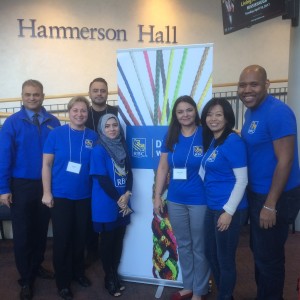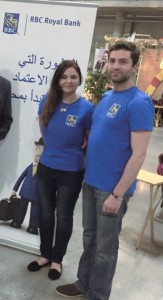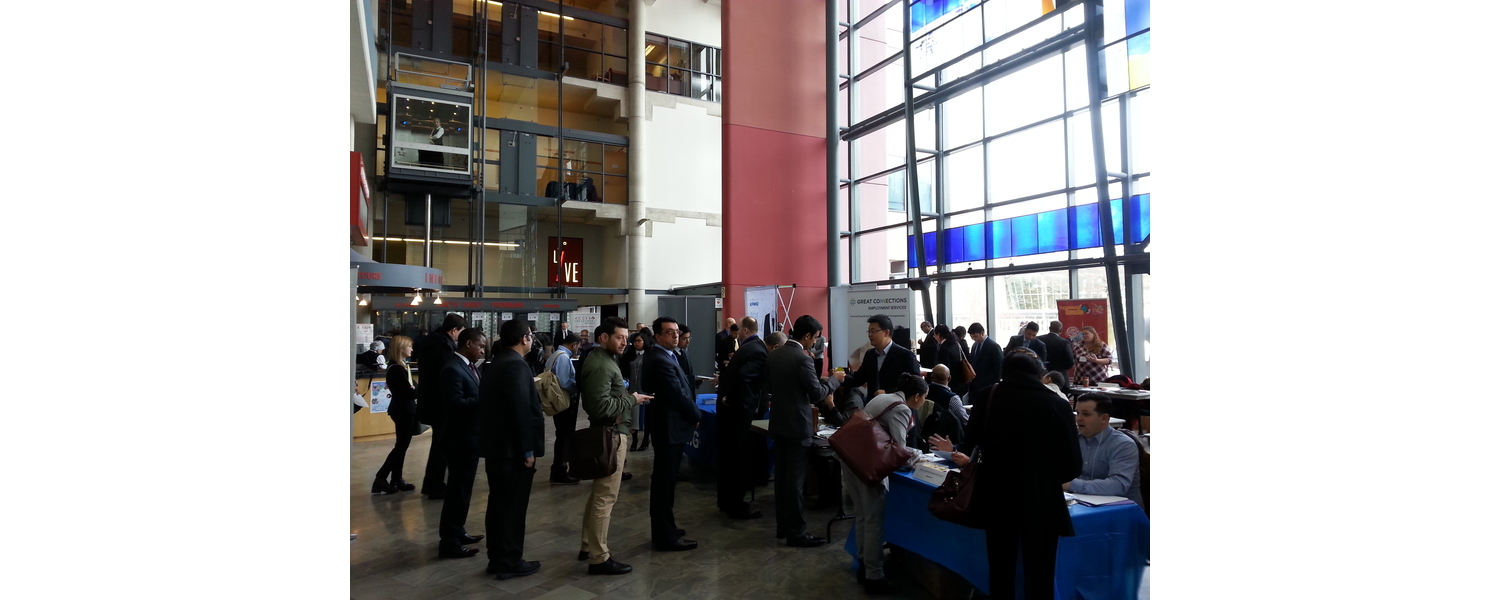Committing to diversity and inclusion means looking at the potential talent in all diverse populations. Working with other employers and community organizations to dispel the myths of refugee talent means a company can be first to access the talent pool available to them.
RBC joined the Syrian Refugees Jobs Agenda Roundtable in late 2015. Like many of the forward looking employers at the table, RBC understands diversity and inclusion. According to Vivian Li, Senior Manager of Inclusive Recruitment, it’s essential for employers to move beyond understanding to action. Diversity and Inclusion is one of RBC’s core values, from talent sourcing to hiring, to talent management and development. Two years ago, the financial giant renewed its purpose of helping clients thrive and communities prosper.
The return on investment for both of those goals is obvious. RBC is building a strategic market advantage. The impact of that purpose is wide ranging. Li says that in order to help clients prosper, RBC must also ensure that its talent prospers and represents the communities they serve.
RBC is well known for its diversity and inclusion commitment to newcomers to Canada. Until recently, that’s typically meant immigrants. RBC has come to see newcomers to Canada as an important talent pool. For RBC, newcomers bring diverse perspectives, experience and connections to the team. Their ability to connect with diverse communities has helped RBC build a strategic market advantage in Canada. As well, their international experience and expertise has meant that the multinational excels in the global market.
RBC joined the Syrian Refugees Jobs Agenda Roundtable, convened by Hire Immigrants, because the company has something to offer others in diverse hiring. Coming together with other employers at the Roundtable has allowed for ‘out of the box’ thinking and being more solutions-oriented to help refugees access employment. RBC’s experience, success and willingness to share, has been very valuable for other employers at the Roundtable and beyond.
Strategically, joining the Roundtable allowed RBC to tap into the talent pool at an early stage. Li says, “We all want to attract the best talent. Recent experience shows that there is an untapped talent pool among refugees, once you start engaging directly. By engaging and participating, providing support and better opportunities, we can access them first.” By profiling the opportunities it has to offer early on, RBC showed refugees it was interested and supportive of hiring them.
Li says that RBC also had things to learn from the Roundtable. Every group has their own unique challenges when seeking employment. Within newcomer circles, refugees have specific challenges different from those of immigrants. Importantly, the Roundtable includes community organizations, and RBC has been able to connect with organizations directly serving refugees. These groups understand the unique challenges facing refugees and provide invaluable support to help employers understand their role in helping refugees to overcome employment barriers. Through collaboration at the Roundtable with these community groups, RBC recognized the talent refugees bring to Canada, and that recruiting this talent would require a new approach.
Working with community groups helped to build trust among the refugee community. RBC came to understand that a different recruitment process providing additional supports would benefit both refugees and them as an employer. A recent RBC hire, and former Syrian refugee, Ahmad Aiyal, credits this support with helping him on the path to success. Aiyal came to Canada in August 2016, with a background in retail sales management. He was focused on finding meaningful employment. He didn’t want to fall into a survival job rut. His goal was to find work where he could fully utilize his skills, passion and personality.

Team RBC at Syrian Newcomer Job Fair
June, 2016
By connecting with ACCES Employment, Aiyal was able to get support, take a sales and marketing course, and become job ready. ACCES has shown leadership on the Roundtable, leveraging their job-ready candidates to support local employers’ labour needs. Through ACCES, Aiyal was informed about an upcoming job fair that would feature employers from the Roundtable. Job fairs can be unfamiliar and intimidating for newcomers, especially refugees. To help overcome this barrier, ACCES set up a pre-job fair speed mentoring session that included volunteer staff from employers like RBC.
These volunteer mentors were key. Li realized that the RBC recruitment team are not the only group in RBC who might be able to help refugees become oriented to the job fair environment. She worked with Mosaic, RBC’s Employee Resource Group (ERG), which sent staff volunteers to the ACCES sessions. They were interested, supportive, and important resources. Aiyal says meeting RBC employee Michelle Alhindi at a February 2017 mentoring session was his employment tipping point. Alhindi immediately recognized his potential and transferable skills. When he went to the subsequent job fair, he was prepared to meet the recruiters.
In March 2017, Aiyal became a licensed Insurance Advisor at RBC. Finding employment that utilizes his skills and experience means RBC has an enthusiastic new hire. He feels very positive about his new employer, the workplace culture, and sees RBC’s commitment to diversity and inclusion every day. As a former refugee, he feels stable, settled, and able to provide his spouse and two children “what they’re supposed to have.”
The transition to living in Canada was challenging. Aiyal says it was important for him to stay focused on his talent and finding a company where he could use his skills. By believing in himself and never giving up, he also found an employer that believed in him.

Ahmad Aiyal & Michelle, RBC Mentor
Aiyal’s message for employers is to “focus on people’s skills and competencies and what employees can bring to them, instead of focusing on Canadian experience. There are a lot of capable people who can do many jobs, it’s not hard to hire them. Don’t be afraid, everyone coming here has high potential. Employers have to believe in everybody. Whoever is coming can add value for them. A person coming from outside can offer as much or more value. It’s about looking at experience, skills, potential and diversity.”
Li says that Canadian employers need to realize how much impact immigrants have on the Canadian workforce. By 2035, it is estimated that 100% of Canada’s population growth will be from immigration. This is a reality employers can, and should, be planning for. Li says it’s important for employers to be strategic in workforce planning to better engage newcomers. Refugees are an important part of the newcomer workforce. An employer that doesn’t tap into this talent pool could be at a disadvantage.
Ultimately, extending diversity and inclusion initiatives to groups like refugees is not simply a strategic workplace imperative, it also impacts corporate culture and talent retention. According to Li, RBC has a 95% employee satisfaction rate. She thinks this incredible success is, in part, due to RBC’s strategic focus on inclusion. It appears she can add Aiyal to the list of satisfied employees at RBC. As the bank continues to hire former refugees, this rate will only increase.
Tips for making it work for you:
- Partner with your community: Tap into the talent pool by partnering with organizations like Magnet, ACCES, and Refugee Career Jumpstart Project (RCJP). They have the connections with refugee job-seekers and communities. Get some tips and advice from those organizations who have collected information on the population, and have learned best practices about hiring and building diverse teams. Learn more about the Roundtable.
- Employers need to build cultural competencies. Engage employees with a deep understanding of culture, such as Employee Resource Groups, as resources to help build and raise awareness, build trust and integration. Do the work to deal with the reality of unconscious bias. RBC has done unconscious bias training with staff and recruiters – the entire talent management continuum, from hiring to promotion to development. It’s very important to address this in the organizational culture. We tend to want to work with people who are like us. How do we switch to consciously being unbiased?
- Don’t just tap into HR or recruitment staff for community events and job fairs. RBC’s culturally diverse Employee Resource Group Mosaic has been an enthusiastic corporate partner, sending volunteers to these events. Not only have newcomer job-seekers found these sessions incredibly useful, but employees also wanted to do more in the future. They loved that their employer is engaged in this meaningful community work. And, it has an impact. Mosaic mentor, Alhindi, was able to identify Aiyal’s transferable skills and where he might be a fit in RBC. She was right.
- Invest more in the mentoring sessions. Refugees have particular challenges. Working with those who work with them means you’ll see job candidates who have been given advice, support and who are job ready.
Read more Success Stories from the Syrian Refugees Jobs Agenda Roundtable
